Overview
Caring entrepreneurship embodies business ideas that prioritize empathy, social responsibility, and community well-being. This approach addresses urgent social challenges while fostering economic growth. Have you ever considered how your business could make a difference? The article outlines ten specific business ideas, such as home care services and mental health counseling. These ventures not only cater to market needs but also contribute positively to societal health and resilience. Imagine the potential for compassionate businesses to thrive financially while making a meaningful impact. You are not alone in this journey; together, we can create a better future.
Introduction
In a world increasingly shaped by social challenges, a new breed of entrepreneurs is emerging—those who prioritize empathy and community well-being over mere profit. Caring entrepreneurship is not just a trend; it represents a transformative business model that seeks to address critical societal issues while enhancing the quality of life for individuals and communities. As we approach 2025, the significance of this approach becomes even more pronounced, particularly for small businesses recognizing the value of purpose-driven ventures. With a focus on resilience, customer loyalty, and social responsibility, caring entrepreneurs are redefining success, proving that financial viability and meaningful impact can coexist.
Have you ever felt overwhelmed by the challenges our society faces? You’re not alone. Many individuals and communities are searching for ways to create positive change. This article explores the essence of caring entrepreneurship, its benefits, and practical steps for aspiring business owners looking to make a difference while thriving in today’s dynamic economy. Together, we can navigate this journey toward a more compassionate and impactful future.
Understanding Caring Entrepreneurship
Caring entrepreneurship represents a transformative model that places empathy, social responsibility, and societal well-being at its core. This approach goes beyond mere profit-making; it actively seeks to address urgent social challenges and enhance the quality of life for individuals and communities alike. By fostering a sense of purpose and connection, compassionate entrepreneurs cultivate resilience and create a more significant impact in our rapidly changing economy as we move into 2025.
The importance of empathy in business has never been clearer. Entrepreneurs embracing this model often find themselves rewarded with increased customer loyalty and robust local support, both of which are crucial for long-term success. Notably, small businesses, which employ 47.1% of all private-sector workers, are increasingly recognizing the value of compassionate entrepreneurship. Many individuals are transitioning from traditional jobs to self-employment opportunities that align with their values, emphasizing this shift.
This transition is especially vital for career changers looking to leverage their transferable skills and gain control over their financial futures, particularly in light of the limitations posed by conventional career paths and age-related factors.
The benefits of caring entrepreneurship extend beyond individual businesses; they ripple through communities, enhancing overall well-being. By prioritizing social responsibility, these business leaders contribute to healthier, more vibrant neighborhoods. Recent trends reveal that while recruitment and retention challenges have dropped to 19%, issues related to capital and cash flow remain, highlighting the need for innovative models focused on engagement and support.
Furthermore, the financial landscape for compassionate innovators is influenced by programs like the Paycheck Protection Program (PPP), which have been crucial for many small businesses facing economic difficulties.
As inflation and rising costs become pressing issues for small business owners this year, compassionate innovation offers a framework for addressing these economic realities. As we advance into 2025, the landscape of compassionate entrepreneurship continues to evolve, showcasing numerous successful models that not only thrive financially but also play a significant role in strengthening societal resilience and providing wealth-building opportunities for entrepreneurs.
The commitment to compassionate entrepreneurship is not just a trend; it is a vital component of a sustainable and meaningful strategy that deeply resonates with today’s socially conscious consumers. By addressing the urgent challenges of employability and financial independence, compassionate entrepreneurs are poised to create meaningful change in their communities while achieving their personal and professional aspirations.
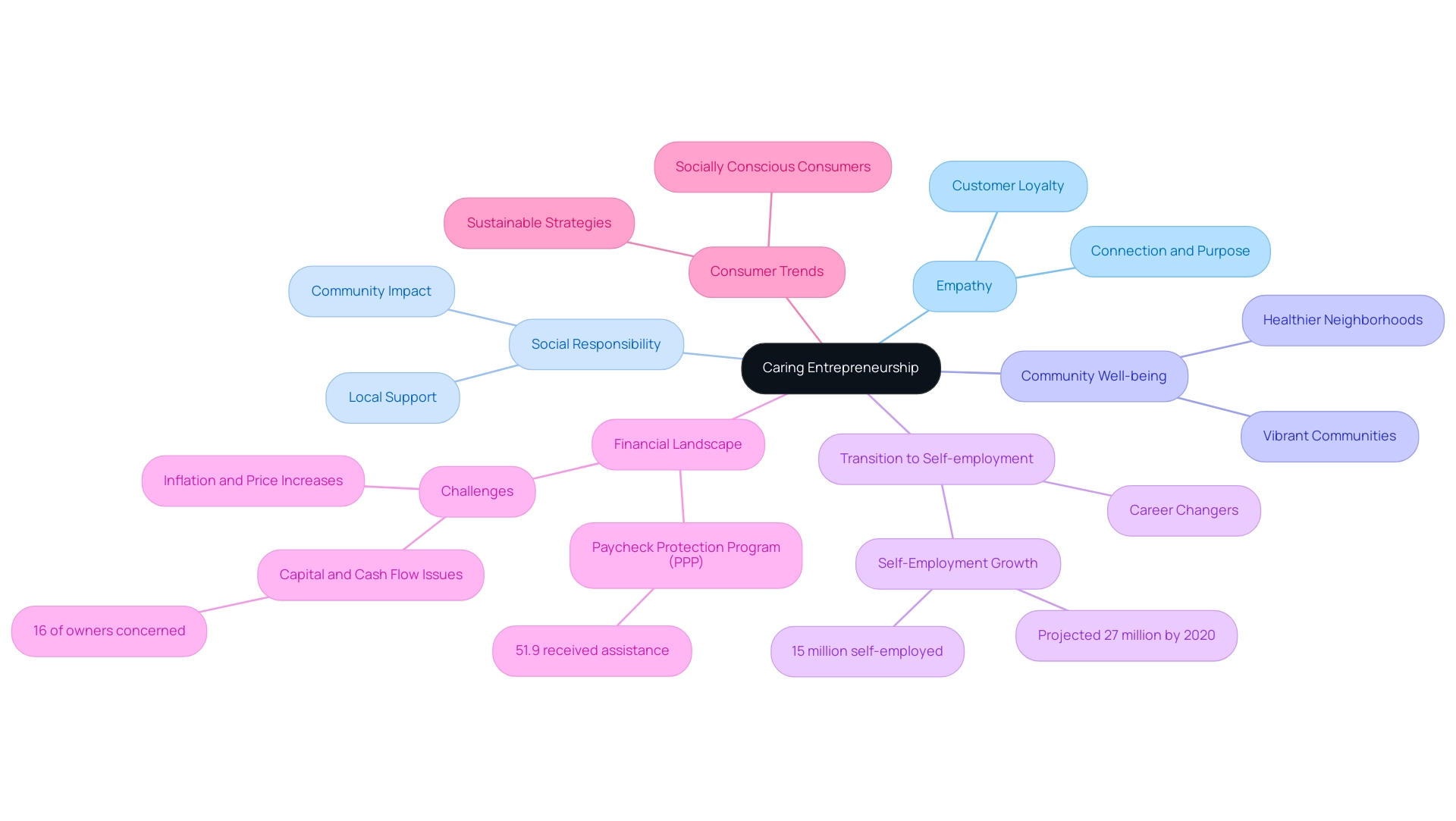
Top 10 Caring Business Ideas for Entrepreneurs
- Home Care Services: This sector is rapidly expanding, reflecting a growing need for in-home assistance for the elderly and disabled. With government funding for home healthcare programs increasing, businesses can anticipate a revenue growth of 10-20%. In Canada alone, around 1.4 million individuals received home care in 2020, supported by a robust network of 682 providers, highlighting the established demand for these essential services. Furthermore, home healthcare agencies have opportunities to expand service offerings, adopt advanced technologies, and improve workforce management to deliver value-based care at home. As Parnell Woodard, a Career Ownership Coach, emphasizes, “Organizations must find a way to cover their costs without pricing customers out of the equation, all while maintaining high-quality service.”
- Local Wellness Programs: These initiatives aim to organize health and wellness workshops in nearby areas, addressing the growing interest in preventive health measures. By encouraging public involvement and promoting healthy lifestyles, these programs can significantly enhance public health outcomes. We understand that community engagement can lead to lasting change, fostering a healthier environment for everyone.
- Eco-Friendly Products: Entrepreneurial ideas can tap into the rising consumer demand for sustainable products that promote environmental health. This market trend not only supports ecological initiatives but also aligns with the values of socially conscious consumers. You are not alone in wanting to make a positive impact on the planet.
- Mental Health Counseling: As awareness of mental health issues continues to rise, providing support services for mental well-being has become a crucial opportunity. Accessible counseling can help individuals navigate their challenges, improving overall community health. It is vital to recognize that seeking help is a strength, and support is available.
- Pet Care Services: With pet ownership on the rise, compassionate care services such as walking and grooming are in high demand. This sector offers entrepreneurial opportunities that allow individuals to merge their passion for animals with a lucrative business model. Imagine turning your love for pets into a fulfilling career.
- Childcare Services: Establishing a daycare that emphasizes nurturing and educational experiences can meet the needs of working parents. This enterprise not only supports families but also fosters the development of future generations through entrepreneurial ideas. Providing a safe and enriching environment for children is a rewarding endeavor.
- Food Delivery for Seniors: Delivering healthy meals to seniors who may struggle with shopping is a crucial service. This entrepreneurial idea addresses nutritional needs while promoting independence among the elderly population. We understand the importance of maintaining dignity and health in later years.
- Support Groups: Facilitating groups for individuals facing similar challenges, such as grief or addiction, can provide essential emotional support. These groups promote connections among individuals and assist participants in navigating their journeys together. You are not alone on this path; shared experiences can foster healing.
- Gardening: Creating spaces for local members to grow their own food promotes sustainability and encourages healthy eating habits. This initiative can also strengthen social ties and enhance local food security. Imagine the joy of cultivating your own garden and sharing its bounty with others.
- Skill Development Workshops: Offering classes that teach valuable skills related to entrepreneurial ideas to underprivileged groups can empower individuals and improve their employability. This approach not only aids participants but also enhances the overall economic well-being of the area. Together, we can uplift communities through education and skill-building.
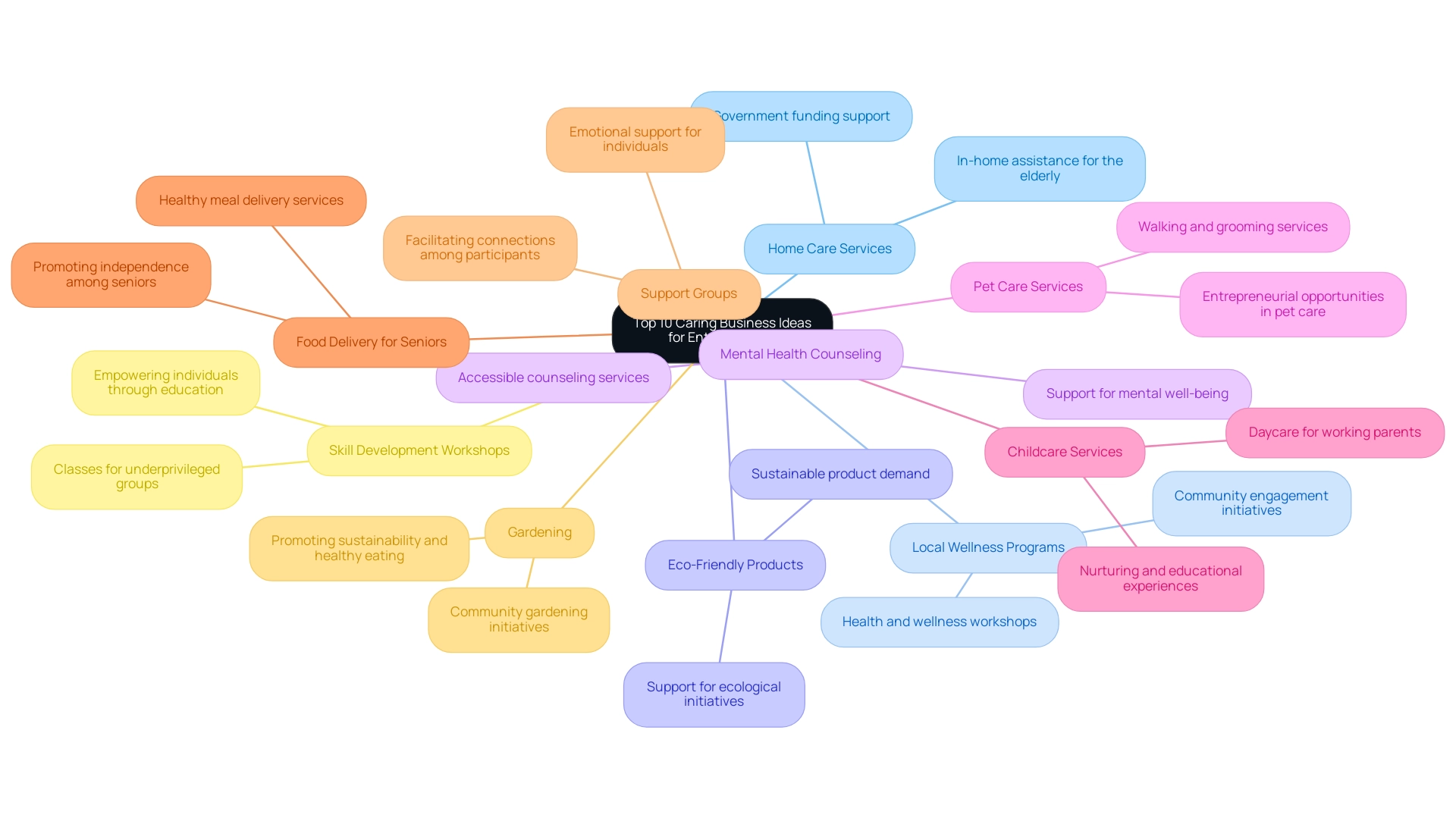
Identifying Market Gaps for Caring Ventures
Identifying market gaps is a crucial step for aspiring business owners, particularly in the caring sector. This process begins with thorough research into local needs, allowing business owners to pinpoint areas where current services fall short. Engaging with local community members through surveys and discussions can provide invaluable insights, while analyzing demographic trends may uncover emerging opportunities.
For instance, the aging population is driving an unprecedented demand for senior care services. Projections indicate a significant increase in the need for assisted living options as this demographic peaks in the latter part of the 2020s. Furthermore, the growing awareness of mental health issues has created an urgent need for accessible counseling services, especially as statistics suggest that by 2025, the demand for mental health services will continue to rise. In this context, addressing social determinants of health (SDOH)—such as housing, education, and access to nutritious food—will be essential for entrepreneurs looking to make a meaningful impact.
LaShuan Bethea, Executive Director of the National Center for Assisted Living, emphasizes that “population health management will be essential in helping seniors stay healthy and enabling providers to offer more personalized and preventative care for seniors who require assisted living services.” This underscores the importance of tailored services in the senior care market.
Moreover, the urgent need for new senior housing options is highlighted by the case study titled “Need for New Senior Housing Development,” which illustrates the accelerating demand for senior housing as the aging population is projected to peak in the latter part of the 2020s. Entrepreneurs who focus on these recognized gaps can develop business ideas that not only thrive financially but also make a significant difference in their communities. By conducting community needs assessments, they can gain a deeper understanding of the specific requirements of their target demographics, ensuring their services are both relevant and beneficial.
This strategic approach not only positions new ventures for success but also contributes positively to societal well-being.
Furthermore, by 2030, a significant number of family caregivers are expected to transition into professional caregiving roles, forming a ‘Caregiver Corps.’ This evolving landscape of support provides additional opportunities for business owners to create and address the growing need for assistance services.
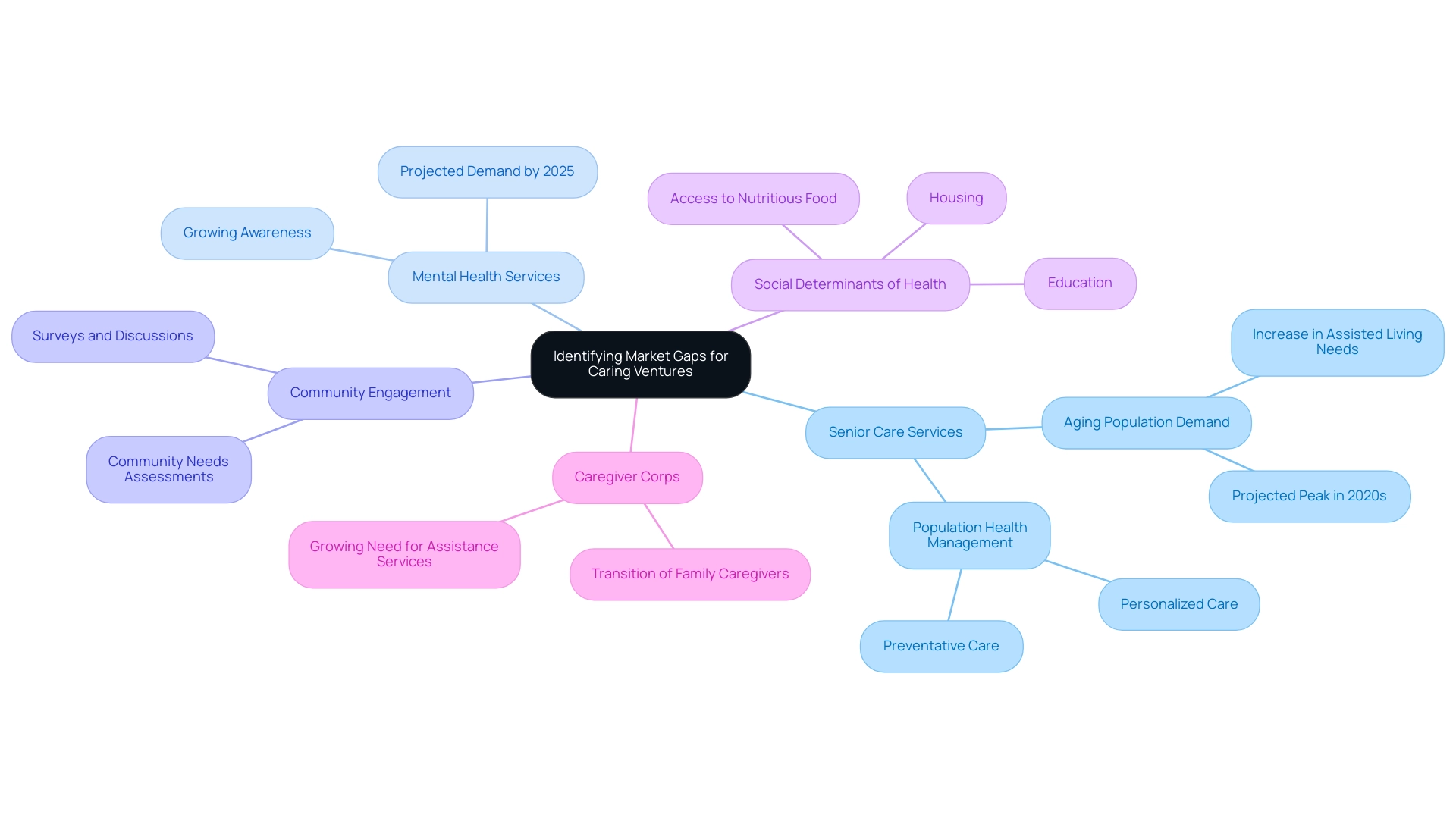
Aligning Personal Skills with Caring Business Ideas
To effectively align your personal skills with entrepreneurial business ideas, it’s important to conduct a thorough self-assessment. This helps identify your strengths, weaknesses, and passions. This process is crucial; studies show that individuals who utilize self-assessment tools are more likely to succeed in their ventures. In the evolving landscape of 2025, where conventional career options are increasingly limited and the job market is characterized by short-lived roles, this alignment has become even more significant.
Consider this: if you have a healthcare background, you might find great satisfaction in launching a home care service. In 2022, 25% of patients used telehealth services, showcasing a growing market opportunity. Alternatively, if you possess strong communication skills, you could thrive by organizing support groups, contributing to community engagement and empowerment. However, we must also recognize the challenges posed by a declining career economy and the critical need for financial planning, especially for funding a longer active life expectancy.
By utilizing your distinctive skills and concentrating on your passions, you can create ventures that not only satisfy market needs but also align closely with your personal values and interests. Experts emphasize that this alignment is a key factor in achieving financial freedom and personal agency in today’s economic climate. Notably, over 89% of business owners work weekends, and 96% express no desire to return to a regular job, underscoring the commitment and passion required in this field.
Research shows that individuals who have conducted self-assessments and aligned their skills with their entrepreneurial business ideas report higher satisfaction and success rates in their ventures. This approach fosters personal fulfillment while contributing to the overall success of their enterprises. As Parnell Woodard, a Career Ownership Coach, states, ‘Transitioning to career ownership empowers individuals to achieve their career goals.’
Moreover, the case study on employee monitoring trends illustrates how businesses are adjusting to shifts in the workforce. This offers possibilities for aspiring business owners to explore tech-related ventures that match their strengths. Therefore, it is crucial for you to take control of your career path, addressing employability concerns and actively planning for your financial future.
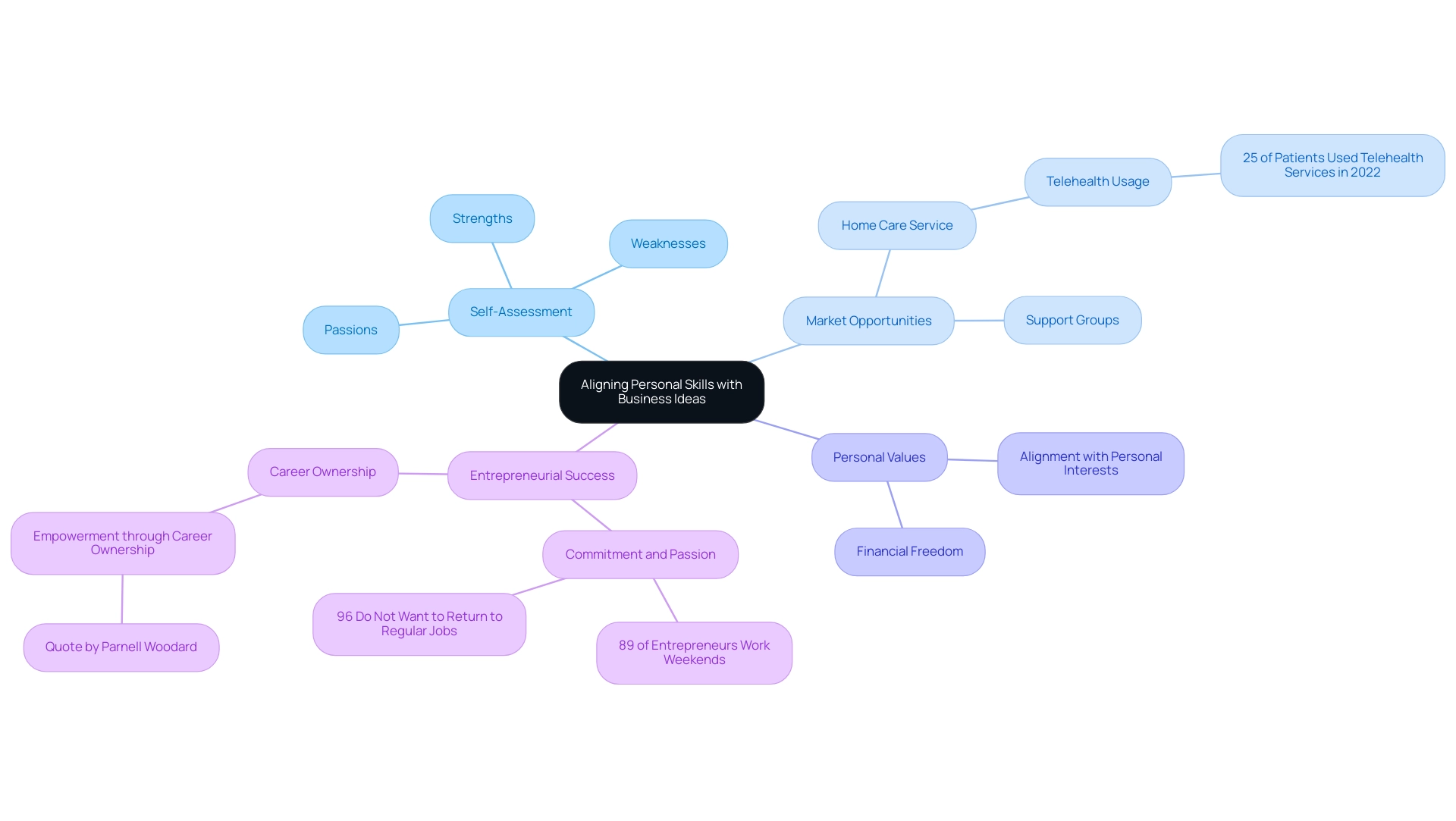
The Power of Networking in Caring Entrepreneurship
Networking is essential for business owners, particularly those operating within caring industries. We understand that establishing connections with fellow entrepreneurs, community leaders, and potential clients can expand opportunities for collaboration and growth significantly. In 2025, statistics reveal that 90% of new business ventures in the U.S. required capital at startup, underscoring the importance of building relationships that can lead to funding and support.
To enhance your networking efforts, consider attending pivotal events like the International Business Ownership Expo in New York City, scheduled for May 30th – June 1st, 2024. This event is the largest premier franchise show in the U.S. and serves as a powerful platform for aspiring entrepreneurs to connect with over 300 exhibiting franchise brands and industry experts. It offers invaluable resources and comprehensive educational seminars aimed at fostering financial self-sufficiency and empowerment, produced in exclusive partnership with the International Franchise Association and the Department of Commerce. You are not alone in this journey; many entrepreneurs leverage local events, professional organizations, and social media platforms to engage with like-minded individuals.
A study from Zippia indicates that 61% of employees prefer remote group meetings over in-person gatherings, highlighting the shift towards digital networking methods. This trend is especially advantageous for compassionate business owners, who can connect with others in their field without geographical limitations. Additionally, with 76% of solopreneurs working remotely at least some of the time, the significance of digital networking is further underscored.
Fostering a supportive network allows business owners to share resources, gain valuable insights, and create partnerships that amplify their ventures’ impact. Success stories abound in compassionate entrepreneurship, where collaboration has led to innovative solutions and enhanced community support. For instance, the GEM report indicates that 50% of business owners are now solo operators, a demographic that has experienced significant growth since 2020.
Many solopreneurs have utilized digital technology and social media to build their networks, reflecting a shift towards independent business ownership. In supportive industries, the significance of networking cannot be overstated. It not only facilitates access to essential resources but also fosters a sense of community among business owners. By prioritizing networking, compassionate entrepreneurs can significantly enhance their chances of success, driving both personal fulfillment and positive societal impact.
Furthermore, with around 10 million social enterprises generating approximately $2 trillion in revenue and creating close to 200 million jobs, the broader impact of networking in caring industries is evident. Remember, you are not alone in navigating this journey; together, we can create a thriving community.
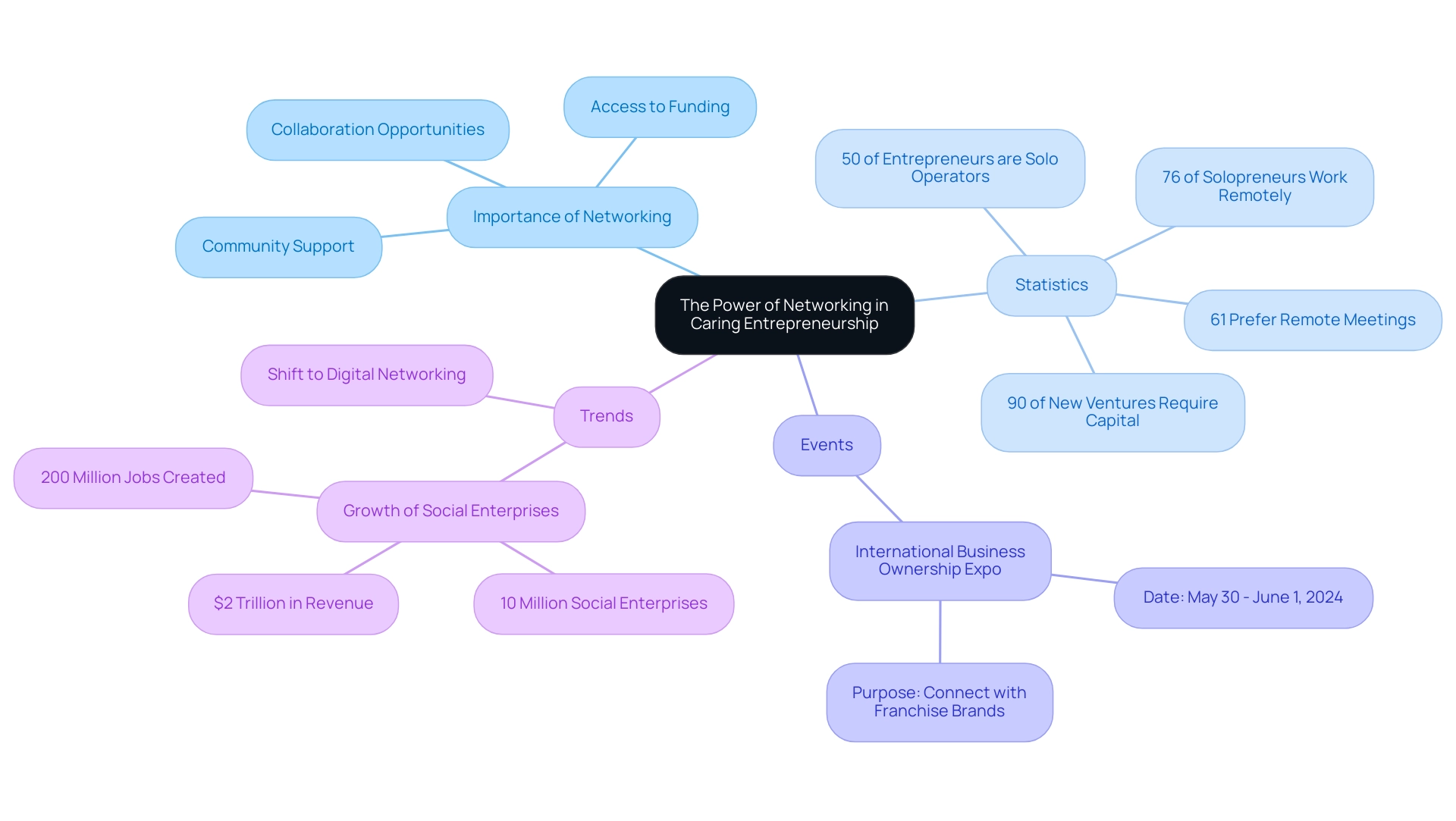
Steps to Launch Your Caring Business Idea
-
Research Your Idea: We understand that starting a venture can be daunting. Begin by validating your concept through comprehensive market research. Understanding your target audience and their needs is crucial. In 2025, effective market research can significantly increase your chances of success, as startups that conduct thorough research are more likely to thrive in competitive environments. As Quantive StrategyAI states, “Quantive StrategyAI turns raw, unstructured data into actionable insights,” highlighting the importance of leveraging data in your research efforts. You are not alone in this journey; gathering insights can empower you to make informed decisions.
-
Create a Plan: Developing a detailed plan can feel overwhelming, but it’s a vital step toward your success. Outline your goals, target market, and financial projections. Statistics indicate that organizations with a formal plan are 16% more likely to achieve their objectives. This document will serve as your roadmap, guiding you through the initial stages and helping you secure funding. Remember, having a clear plan can bring peace of mind as you navigate the entrepreneurial landscape.
-
Secure Funding: Exploring funding options can be a challenge, but there are many avenues available. Investigate loans, grants, and crowdfunding platforms. With the rise of caring ventures, many investors are looking to support enterprises that prioritize social impact. This trend can open doors to financial resources that align with your mission, reassuring you that support is out there for those who seek it.
-
Register Your Venture: Choosing the right structure for your business is essential. Whether it’s a sole proprietorship, LLC, or nonprofit, registering with the relevant authorities establishes your enterprise legally and protects your personal assets. This step may feel intimidating, but it’s a crucial foundation for your entrepreneurial journey.
-
Build Your Brand: Crafting a brand identity that resonates with your mission and values is key to connecting with your audience. A strong brand not only differentiates you from competitors but also fosters trust and loyalty among your customers. In a landscape where 96% of small businesses utilize social media, your online presence will be vital for brand recognition. Remember, your brand is a reflection of your passion and purpose.
-
Launch Marketing Campaigns: Implementing marketing strategies can be exciting yet challenging. Leverage social media, local advertising, and outreach efforts to engage with your audience. Connecting with potential customers through these channels can enhance visibility and attract those who share your values. You have the power to create meaningful connections.
-
Network and Collaborate: Building connections with other entrepreneurs and organizations can be incredibly rewarding. Networking can provide valuable resources, insights, and support as you navigate the challenges of entrepreneurship. Collaboration can also amplify your reach and impact within the community. Remember, you are part of a larger ecosystem of support.
-
Evaluate and Adapt: Regularly assessing your organization’s performance is crucial for growth. Be prepared to make necessary adjustments. The typical B2B sales process required 25% more time in 2024 compared to earlier years, emphasizing the significance of agility in operations. By staying responsive to market changes, you can ensure your venture remains relevant and successful. Additionally, it’s worth noting that from 2000 to 2019, U.S. small enterprises created 10.5 million net new jobs, underscoring the vital role of entrepreneurship in driving economic growth. Embrace the journey, knowing that every step forward contributes to a brighter future.
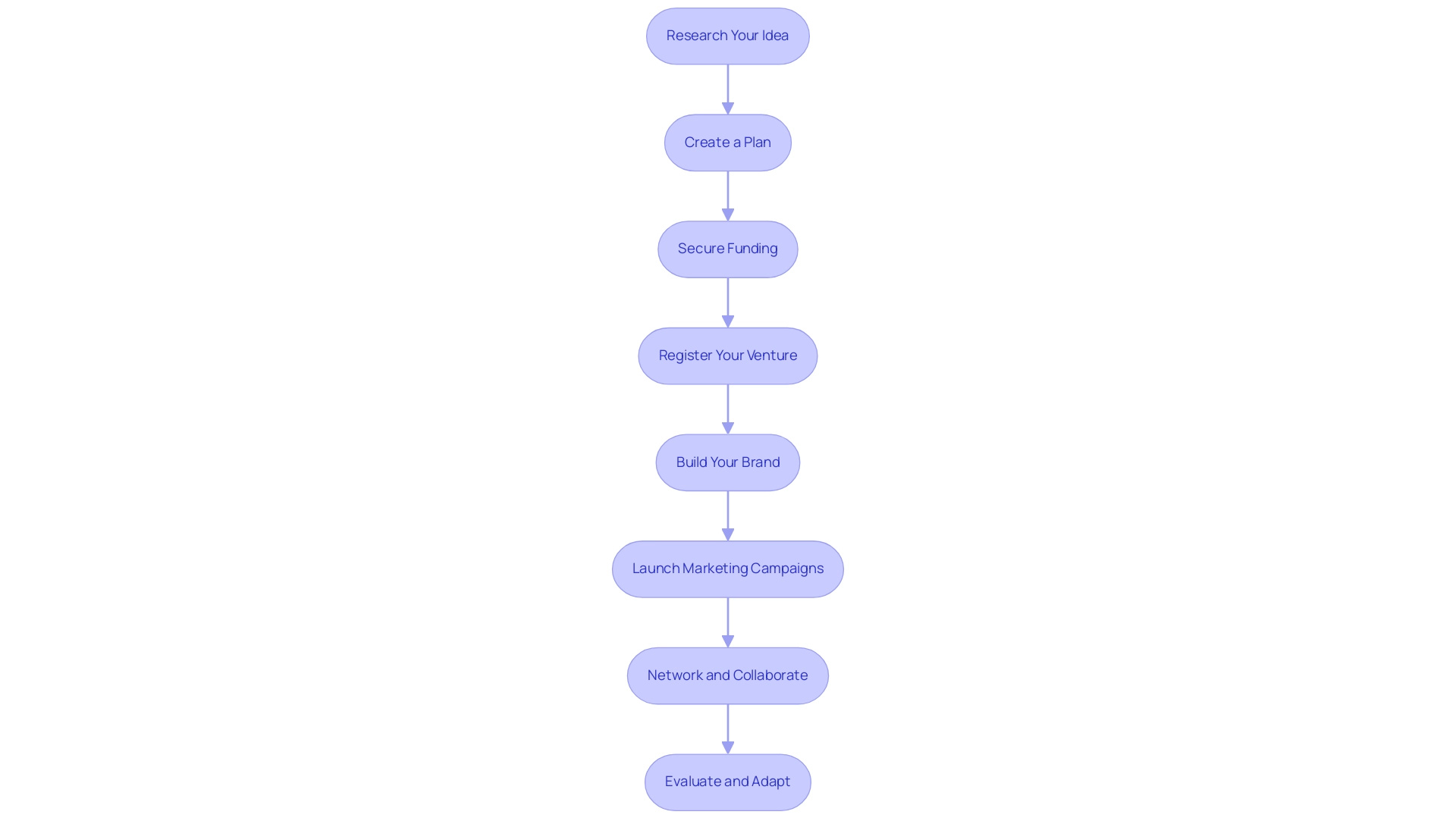
Overcoming Challenges in Caring Entrepreneurship
Caring business owners often face significant challenges, such as funding limitations, intense market competition, and the risk of emotional burnout. It’s disheartening to note that the median business has less than one month of cash on hand, which highlights the financial pressures many startups endure in a declining economy. To navigate these obstacles effectively, it is crucial for business owners to cultivate a robust support network and actively seek mentorship.
As Parnell Woodard, a Career Ownership Coach, emphasizes, ‘Engaging with experienced mentors can provide invaluable insights and guidance, helping business owners to refine their strategies and avoid common pitfalls.’ This mentorship is vital for fostering empowerment and leveraging transferable skills, which can enhance employability in a shifting job landscape.
Moreover, did you know that 10% of business owners seek startup capital from friends and family, while only 1% utilize crowdfunding? This highlights the diverse approaches to overcoming funding challenges. Prioritizing self-care is equally important; business owners must recognize the signs of burnout and take proactive steps to maintain their well-being. Remaining adaptable and open to feedback enables compassionate business owners to pivot their strategies when necessary, ensuring they stay aligned with their mission and objectives.
The landscape of entrepreneurship is evolving. As of 2024, there are approximately 10 million social enterprises globally, generating around $2 trillion in revenue and creating nearly 200 million jobs. This growth underscores the increasing recognition of social entrepreneurship as a vital component of economic resilience and job creation.
Notably, 30% of business owners have only a high school education, indicating that higher education is not a prerequisite for success in this field.
By maintaining a positive mindset and focusing on their mission, compassionate business owners can overcome challenges and continue to make a meaningful impact in their communities. The journey may be fraught with difficulties, but with the right support and strategies, they can thrive in their entrepreneurial endeavors while taking charge of their career paths and financial futures. Additionally, developing wealth-building strategies and understanding the importance of financial freedom are essential for long-term success in today’s economy.
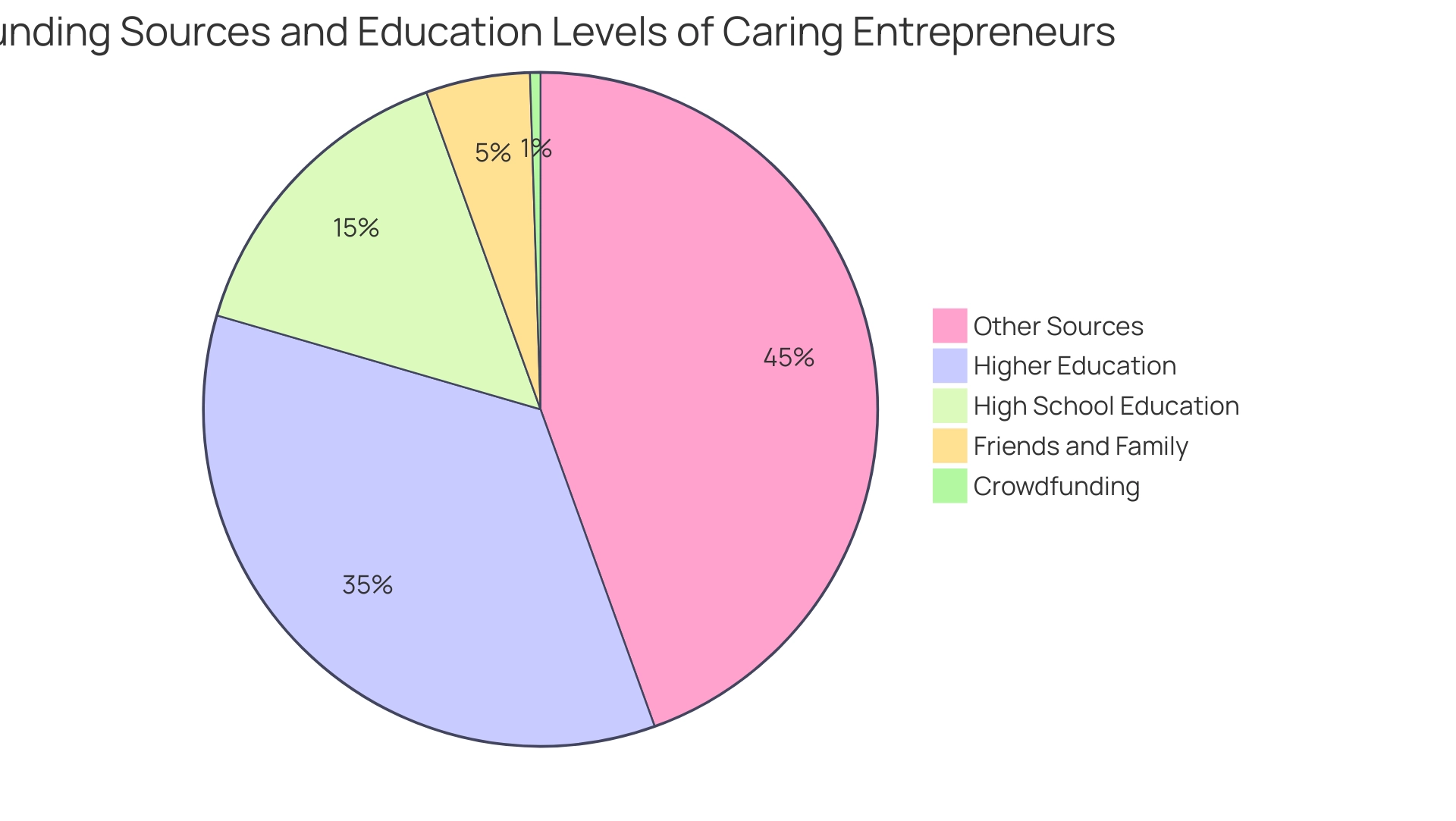
Embracing Continuous Learning in Your Entrepreneurial Journey
Continuous learning is truly a cornerstone for business owners who are eager to discover innovative entrepreneur business ideas that not only maintain competitiveness but also foster creativity in their ventures. Engaging in workshops, enrolling in online courses, and attending industry conferences—like the International Business Ownership Expo in New York City from May 30th to June 1st, 2024—are effective strategies for enhancing skills and acquiring knowledge. This leading franchise event connects aspiring individuals with over 300 exhibiting franchise brands and offers educational seminars focused on achieving financial independence and empowerment in ownership.
We understand that a recent study revealed that 94% of employees would stay longer at a company that invests in their career development. This underscores the importance of ongoing education for personal growth, employee retention, and overall satisfaction.
As Naphtali Bryant, an executive coach and leadership development consultant, wisely states, “Think of it as a unified strategy for agility.” This perspective highlights the necessity for innovators to be flexible and responsive in a rapidly changing commercial landscape. Entrepreneurs are encouraged to actively seek feedback from customers and peers to identify areas for improvement, leading to innovative entrepreneur business ideas and fostering a responsive environment.
By nurturing a culture of learning within their organizations, business owners can adapt to market shifts and enhance operational effectiveness, ultimately paving the way for innovative entrepreneur business ideas.
In 2025, the significance of professional growth for compassionate business owners is more pronounced than ever. Workshops and courses tailored to the unique challenges of support industries can provide invaluable insights and strategies. It’s important to recognize that in 2019, female-owned enterprises earned an average of $142,900 compared to $474,900 for all privately held firms, highlighting the challenges faced by entrepreneurs in caring sectors.
Furthermore, as career transitioners navigate age-related limitations and the desire to take control of their own destinies, prioritizing continuous learning becomes essential. Those who embrace adaptability, supported by strong connections and a solid work ethic, will be better equipped to innovate and thrive, ensuring their businesses remain relevant and successful. The Entrepreneur’s Source, with its comprehensive and personalized approach to career coaching, emphasizes no-cost services and a structured process, making it an invaluable resource for those navigating their career transitions.
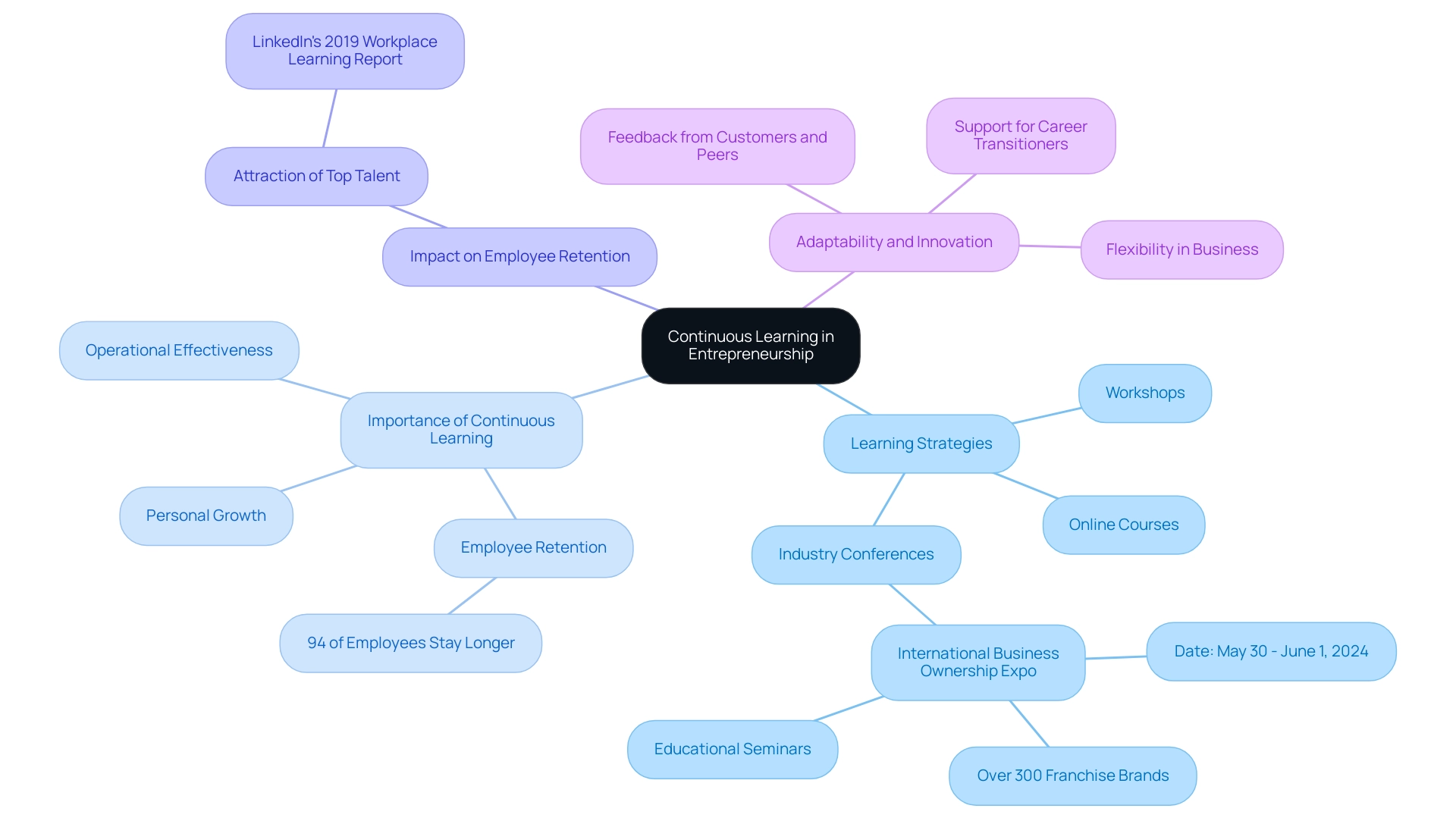
The Community Impact of Caring Entrepreneurship
Caring entrepreneurship embodies a range of business ideas that play a vital role in transforming our communities. By addressing pressing social issues, these enterprises not only generate employment but also drive economic growth. Companies that prioritize the well-being of their surroundings often find themselves rewarded with heightened customer loyalty and support, paving the way for sustainable success. For instance, a local home care service not only provides essential assistance to families but also stimulates the local economy by creating jobs for residents.
This mutual relationship fosters a positive feedback cycle, where the success of compassionate enterprises enhances local welfare, and in turn, a thriving society supports these enterprises.
Looking ahead to 2025, statistics reveal the significant impact of compassionate enterprises on job creation, underscoring their importance in the economy. Eric Van Nostrand, Assistant Secretary for Economic Policy, notes that small enterprises have generated a disproportionate share of jobs since the pandemic, contributing 71 percent of net private job gains since the last economic cycle peak in late 2019. Moreover, one in five small enterprises currently unaffected by COVID-19 anticipate changes if the situation worsens, highlighting the resilience and adaptability of compassionate entrepreneurs.
The influence of compassionate entrepreneurship extends beyond mere job creation; it enriches societal life. By focusing on local needs, these enterprises effectively tackle social challenges, leading to an improved quality of life for residents. For example, Joseph D’Souza’s initiative, Smartphone Thoughts, began as a tech blog and evolved into a reputable source of information, illustrating how compassionate entrepreneurship can adapt and flourish while serving societal interests. This blog not only offers insights into tech devices but also engages with local tech enthusiasts, fostering a sense of community.
As we move forward, the economic benefits of compassionate entrepreneurship will remain evident. Experts emphasize the importance of ongoing education and adaptation in industry practices. Indra Nooyi, former CEO of PepsiCo, reminds us that these qualities are essential for leaders in today’s dynamic environment. By embracing a compassionate approach, entrepreneurs not only create jobs but also develop business ideas that contribute to the overall health and vitality of their communities, paving the way for a brighter future.
Furthermore, with an estimated 11,599 large enterprises in Germany, the global landscape of compassionate entrepreneurship highlights its potential for economic expansion and job generation on a larger scale.
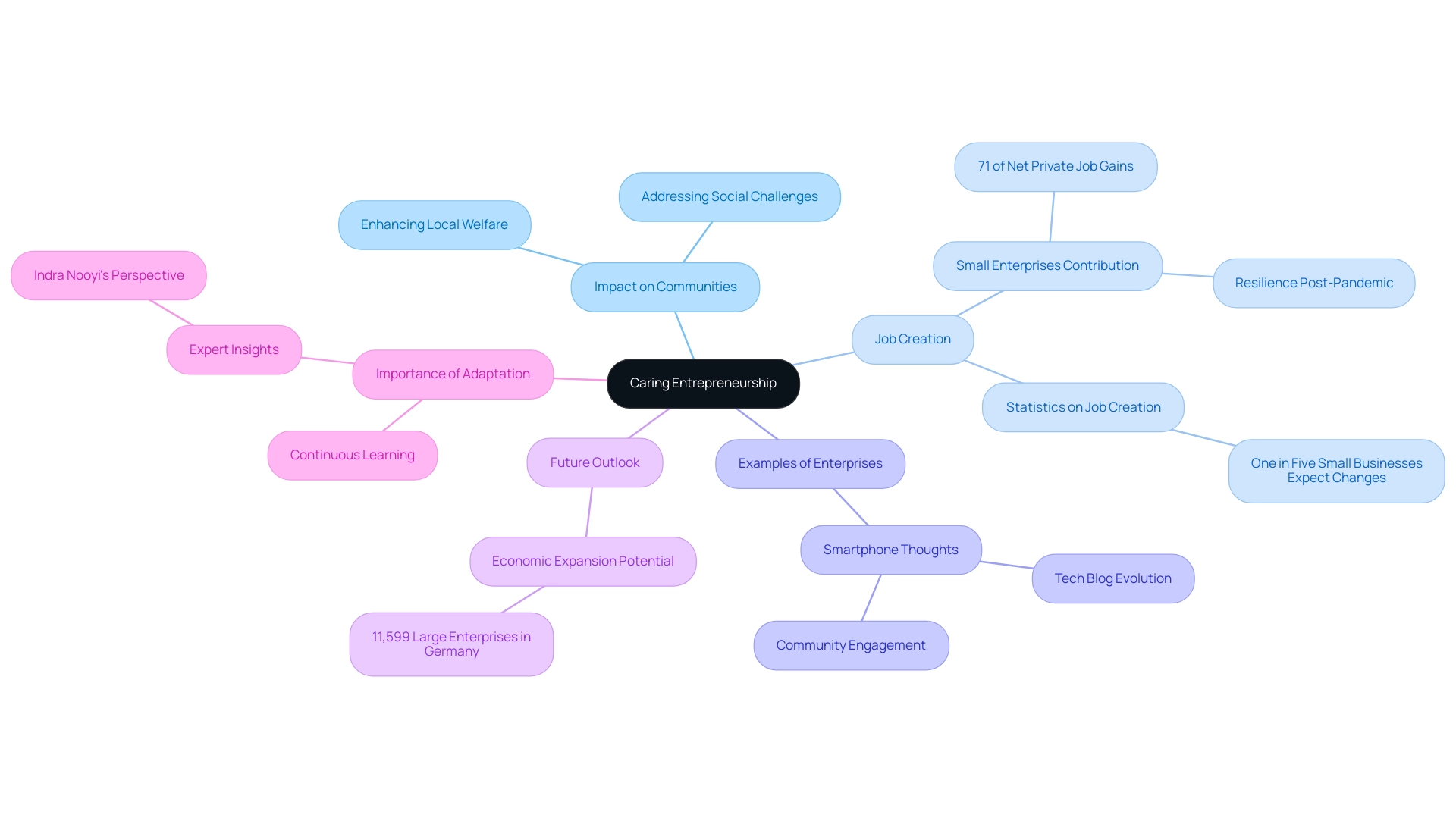
Taking the First Step Towards Your Caring Business
Embarking on the journey to establish a caring enterprise may feel overwhelming. However, this crucial step can transform your aspirations into tangible outcomes, especially in today’s declining career economy where job opportunities are dwindling. Have you identified your passions alongside the specific needs in your area that you aim to address? This alignment can inspire entrepreneurial business ideas that foster both personal fulfillment and potential financial independence. Setting clear, attainable goals is vital; consider creating a structured timeline to guide your progress.
Every small step you take is significant, particularly in a market where employee counts are down by 40%. Actively seeking mentorship or joining networking groups can provide the support and motivation necessary to propel your entrepreneurial business ideas forward. Did you know that mentorship plays a crucial role in entrepreneurial success? Statistics indicate that 70% of mentored ventures report increased growth compared to their non-mentored counterparts.
As you navigate this path, remember that your dedication to compassionate entrepreneurship can inspire ideas that foster personal empowerment and create substantial positive change within your community. Moreover, consider the financial landscape: female-owned enterprises earned an average of $142,900 compared to $474,900 for all privately held ventures, highlighting the potential rewards of your entrepreneurial business ideas. Additionally, 10% of entrepreneurs seek startup capital from friends and family, which can be a crucial funding source as you begin your caring venture.
As Indra Nooyi, former CEO of PepsiCo, wisely stated, ‘Just because you are CEO, don’t think you have landed. You must continually increase your learning, the way you think, and the way you approach the organization.’ This quote underscores the importance of continuous learning and adaptation in your entrepreneurial journey.
To further assist you, download your free Veteran Entrepreneur® Program presentation here, which provides valuable insights and resources for your journey. Embrace the journey ahead, and let your commitment to making a difference guide your entrepreneurial endeavors. Remember, individuals from diverse backgrounds can succeed in starting and running businesses. You are not alone on this path.
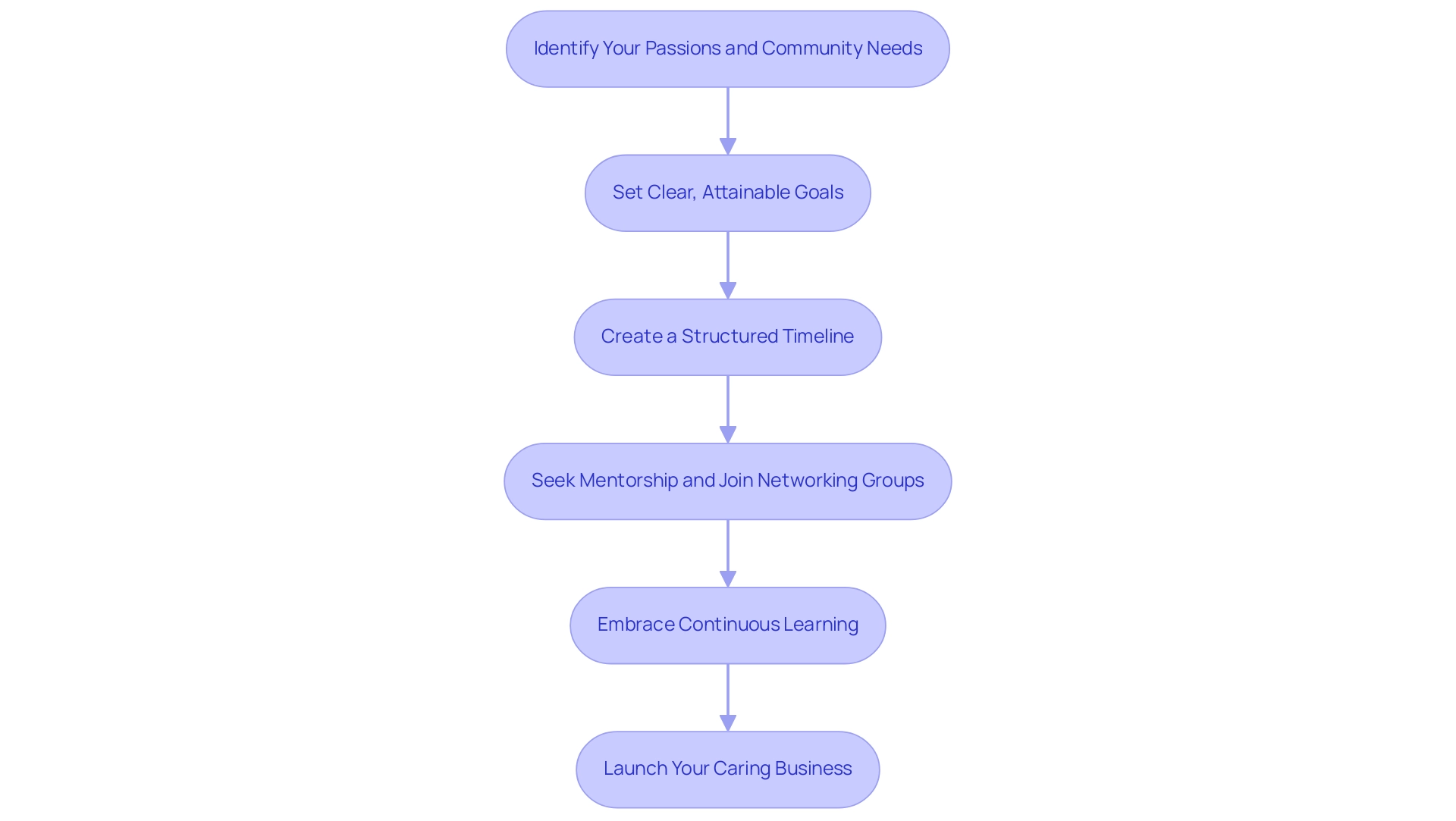
Conclusion
Caring entrepreneurship is not just a trend; it represents a profound shift that places empathy, social responsibility, and community well-being at the heart of business practices. The journey of caring entrepreneurs involves recognizing market needs, aligning personal skills with business ideas, and actively engaging with the community to inspire positive change. By prioritizing social impact alongside financial viability, these entrepreneurs are crafting sustainable businesses that are reshaping the economic landscape, especially as we approach 2025.
The potential benefits of caring entrepreneurship are immense. From enhancing customer loyalty to creating employment opportunities, businesses that adopt this model significantly bolster community resilience and overall well-being. As entrepreneurs face challenges such as funding limitations and market competition, the value of networking and continuous learning becomes evident. By building connections with mentors and peers and committing to ongoing education, entrepreneurs can empower themselves to navigate obstacles and flourish in a dynamic environment.
Ultimately, the commitment to caring entrepreneurship serves as a powerful catalyst for societal transformation. By taking those initial steps toward launching a caring business, aspiring entrepreneurs can channel their passions to meet community needs, sparking a ripple effect of positive change. As the landscape of entrepreneurship evolves, the role of caring businesses will become increasingly vital, paving the way for a future where financial success and meaningful impact coexist harmoniously. Embracing this journey not only fulfills personal aspirations but also contributes to a more compassionate and resilient world for everyone.


